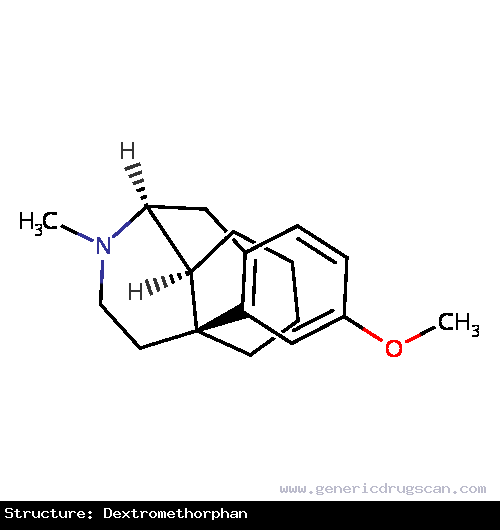Dextromethorphan Drug: Indication, Dosage, Precaution, Side Effect , Storage, Category Type and corresponding Brands - www.genericdrugscan.com
Dextromethorphan
Drug Status in USA : ApprovedDrug Status in Canada : Approved
pronunciation
pronounced as (dex troe meth or' fan)
Why is this medication prescribed?
Dextromethorphan is used to temporarily relieve cough caused by the common cold, the flu, or other conditions. Dextromethorphan will relieve a cough but will not treat the cause of the cough or speed recovery. Dextromethorphan is in a class of medications called antitussives. It works by decreasing activity in the part of the brain that causes coughing.
How should this medicine be used?
Dextromethorphan comes as a liquid-filled capsule, a chewable tablet, a dissolving strip, a solution (liquid), an extended-release (long-acting) suspension (liquid), and a lozenge to take by mouth. It is usually taken every 4 to 12 hours as needed. Follow the directions on the package or prescription label carefully, and ask your doctor or pharmacist to explain any part you do not understand.
Dextromethorphan should only be used according to the label or package directions. Do not take more than the recommended amount of dextromethorphan in a 24-hour period. Refer to the package or prescription label to determine the amount contained in each dose. Taking dextromethorphan in large amounts can cause serious side effects or death.
Dextromethorphan comes alone and in combination with antihistamines, cough suppressants, and decongestants. Ask your doctor or pharmacist for advice on which product is best for your symptoms. Check nonprescription cough and cold product labels carefully before using 2 or more products at the same time. These products may contain the same active ingredient(s) and taking them together could cause you to receive an overdose. This is especially important if you will be giving cough and cold medications to a child.
Nonprescription cough and cold combination products, including products that contain dextromethorphan, can cause serious side effects or death in young children. Do not give these products to children younger than 4 years of age. If you give these products to children 4-11 years of age, use caution and follow the package directions carefully.
If you are giving dextromethorphan or a combination product that contains dextromethorphan to a child, read the package label carefully to be sure that it is the right product for a child of that age. Do not give dextromethorphan products that are made for adults to children.
Before you give a dextromethorphan product to a child, check the package label to find out how much medication the child should receive. Give the dose that matches the child's age on the chart. Ask the child's doctor if you don't know how much medication to give the child.
If you are taking the liquid, do not use a household spoon to measure your dose. Use the measuring spoon or cup that came with the medication or use a spoon made especially for measuring medication.
If you are using the dissolving strips, place them on your tongue and swallow after they melt.
If you are taking the chewable tablets you can allow them to melt in your mouth or you can chew them before swallowing.
If you are taking the extended-release suspension, shake the bottle well before each use to mix the medication evenly.
If you are taking the lozenges, allow them to slowly melt in your mouth.
Stop taking dextromethorphan and call your doctor if your cough does not get better within 7 days, if your cough goes away and comes back, or if your cough occurs with a fever, rash, or headache.
What are the precautions to be followed?
Before taking dextromethorphan,- tell your doctor and pharmacist if you are allergic to dextromethorphan, any other medications, or any of the ingredients in the product you plan to take. Check the package label for a list of the ingredients.
- do not take dextromethorphan if you are taking a monoamine oxidase (MAO) inhibitor such as isocarboxazid (Marplan), phenelzine (Nardil), selegiline (Eldepryl, Emsam, Zelapar), and tranylcypromine (Parnate), or if you have stopped taking an MAO inhibitor within the past 2 weeks.
- tell your doctor and pharmacist what prescription and nonprescription medications, vitamins, nutritional supplements, and herbal products you are taking or plan to take.
- tell your doctor if you smoke, if you have a cough that occurs with a large amount of phlegm (mucus), or if you have or have ever had breathing problems such as asthma, emphysema, or chronic bronchitis.
- tell your doctor if you are pregnant, plan to become pregnant, or are breast-feeding. If you become pregnant while taking dextromethorphan, call your doctor.
- if you have phenylketonuria (PKU, an inherited condition in which a special diet must be followed to prevent mental retardation), you should know that some brands of chewable tablets that contain dextromethorphan may be sweetened with aspartame, a source of phenylalanine.
What are possible side effects of this medication ?
Dextromethorphan may cause side effects. Tell your doctor if any of these symptoms are severe or do not go away:- dizziness
- lightheadedness
- drowsiness
- nervousness
- restlessness
- nausea
- vomiting
- stomach pain
- rash
Dextromethorphan may cause other side effects. Call your doctor if you experience any unusual problems while you are taking this medication.
How to store the medication and dispose it of after its use later?
Keep this medication in the container it came in, tightly closed, and out of reach of children. Store it at room temperature and away from excess heat and moisture (not in the bathroom). Throw away any medication that is outdated or no longer needed. Talk to your pharmacist about the proper disposal of your medication.
Drug Category/Class
- Antitussive Agents
- Excitatory Amino Acid Antagonists
- Opium Alkaloids and Derivatives
- Cough and Cold Preparations
- Respiratory System
- Cytochrome P-450 CYP2C19 Inducers
- Cytochrome P-450 CYP2B6 Inhibitors
- CYP2B6 Inhibitors (strong)
- Cytochrome P-450 CYP2B6 Inducers
- Cytochrome P-450 CYP2C9 Inhibitors
- Cytochrome P-450 CYP2C9 Inducers
- CYP2E1 Inhibitors
- CYP2E1 Inducers
- CYP2E1 Indu
| Prescribed | For treatment and relief of dry cough. |
| Weight : | 271.404 |
| Structure | Dextromethorphan |
 | |
| Formula | C18H25NO |
Dextromethorphan has 13 Brands listed
Search Generic Drugs alphabetically
